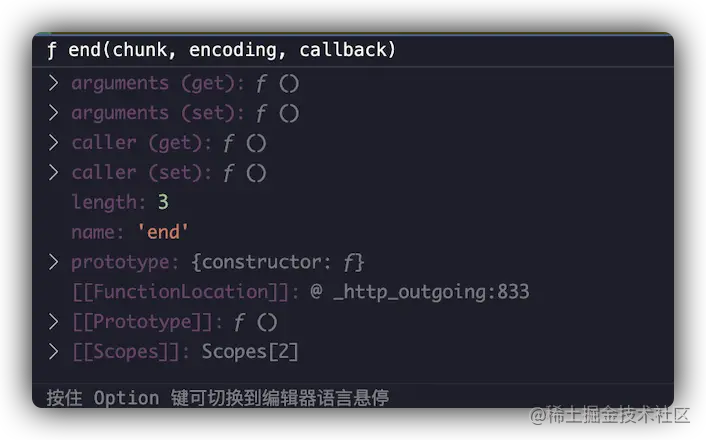 Web Front-end
Web Front-end
 JS Tutorial
JS Tutorial
 A brief analysis of res.send() and res.end() in the node Express framework
A brief analysis of res.send() and res.end() in the node Express framework
A brief analysis of res.send() and res.end() in the node Express framework
This article will talk about node Express framework and learn about res.send() and res.end() in Express. I hope it will be helpful to everyone!

In the server-side code using Node.js, if you are using the Express framework, then for a request, There are often two ways to respond:
1 2 3 4 5 6 7 8 |
|
So what is the difference between these two ways? What are their respective application scenarios? This is what I need to make clear today.
Express res.end()
Definition
It can end quickly without requiring any data response.
This method actually comes from Node core, specifically the response.end() method of http.ServerResponse.Use:

##Syntax
1 |
|
- data
##In-depth If you pass an object into the
res.end() method, an error will occur:
 and res.end() in the node Express framework)
DefinitionSends an HTTP response message to the requesting client.
Syntax
1 |
|
Go deeperThrough code debugging, we can find that Express’s
res.send() method is ultimately called Also the response.end() method of http.ServerResponse.Use: <div class="code" style="position:relative; padding:0px; margin:0px;"><pre class='brush:php;toolbar:false;'>// node_modules/express/lib/response.js
res.send = function send(body) {
var chunk = body;
var encoding;
……
if (req.method === &#39;HEAD&#39;) {
// skip body for HEAD
this.end();
} else {
// respond
this.end(chunk, encoding);
}
return this;
};</pre><div class="contentsignin">Copy after login</div></div>Comparison<h2 data-id="heading-9"></h2>
<p>Same points<strong><span style="font-size: 16px;"></span></strong>The similarities between Express's res.end() and res.send() methods: </p>
<p></p>
<ul style="list-style-type: disc;">Both of them eventually return to <li> The <p>response.end()<code> method of http.ServerResponse.Use.
DifferencesThe differences between Express’s res.end() and res.send() methods:
- The former can only send string or Buffer type, while the latter can send any type of data.
- From a semantic point of view, the former is more suitable for scenarios without any response data, while the latter is more suitable for scenarios with response data.
- Summary
When using the res.end() and res.send() methods of Express, it is generally recommended to use
res.send() method, so you don’t need to care about the format of the response data, because Express processes the data internally. ~This article is over, thank you for reading!
For more node-related knowledge, please visit:
nodejs tutorialThe above is the detailed content of A brief analysis of res.send() and res.end() in the node Express framework. For more information, please follow other related articles on the PHP Chinese website!

Hot AI Tools

Undresser.AI Undress
AI-powered app for creating realistic nude photos

AI Clothes Remover
Online AI tool for removing clothes from photos.

Undress AI Tool
Undress images for free

Clothoff.io
AI clothes remover

Video Face Swap
Swap faces in any video effortlessly with our completely free AI face swap tool!

Hot Article

Hot Tools

Notepad++7.3.1
Easy-to-use and free code editor

SublimeText3 Chinese version
Chinese version, very easy to use

Zend Studio 13.0.1
Powerful PHP integrated development environment

Dreamweaver CS6
Visual web development tools

SublimeText3 Mac version
God-level code editing software (SublimeText3)

Hot Topics
 The difference between nodejs and vuejs
Apr 21, 2024 am 04:17 AM
The difference between nodejs and vuejs
Apr 21, 2024 am 04:17 AM
Node.js is a server-side JavaScript runtime, while Vue.js is a client-side JavaScript framework for creating interactive user interfaces. Node.js is used for server-side development, such as back-end service API development and data processing, while Vue.js is used for client-side development, such as single-page applications and responsive user interfaces.
 Is nodejs a backend framework?
Apr 21, 2024 am 05:09 AM
Is nodejs a backend framework?
Apr 21, 2024 am 05:09 AM
Node.js can be used as a backend framework as it offers features such as high performance, scalability, cross-platform support, rich ecosystem, and ease of development.
 How to connect nodejs to mysql database
Apr 21, 2024 am 06:13 AM
How to connect nodejs to mysql database
Apr 21, 2024 am 06:13 AM
To connect to a MySQL database, you need to follow these steps: Install the mysql2 driver. Use mysql2.createConnection() to create a connection object that contains the host address, port, username, password, and database name. Use connection.query() to perform queries. Finally use connection.end() to end the connection.
 What are the global variables in nodejs
Apr 21, 2024 am 04:54 AM
What are the global variables in nodejs
Apr 21, 2024 am 04:54 AM
The following global variables exist in Node.js: Global object: global Core module: process, console, require Runtime environment variables: __dirname, __filename, __line, __column Constants: undefined, null, NaN, Infinity, -Infinity
 What is the difference between npm and npm.cmd files in the nodejs installation directory?
Apr 21, 2024 am 05:18 AM
What is the difference between npm and npm.cmd files in the nodejs installation directory?
Apr 21, 2024 am 05:18 AM
There are two npm-related files in the Node.js installation directory: npm and npm.cmd. The differences are as follows: different extensions: npm is an executable file, and npm.cmd is a command window shortcut. Windows users: npm.cmd can be used from the command prompt, npm can only be run from the command line. Compatibility: npm.cmd is specific to Windows systems, npm is available cross-platform. Usage recommendations: Windows users use npm.cmd, other operating systems use npm.
 Is there a big difference between nodejs and java?
Apr 21, 2024 am 06:12 AM
Is there a big difference between nodejs and java?
Apr 21, 2024 am 06:12 AM
The main differences between Node.js and Java are design and features: Event-driven vs. thread-driven: Node.js is event-driven and Java is thread-driven. Single-threaded vs. multi-threaded: Node.js uses a single-threaded event loop, and Java uses a multi-threaded architecture. Runtime environment: Node.js runs on the V8 JavaScript engine, while Java runs on the JVM. Syntax: Node.js uses JavaScript syntax, while Java uses Java syntax. Purpose: Node.js is suitable for I/O-intensive tasks, while Java is suitable for large enterprise applications.
 Is nodejs a back-end development language?
Apr 21, 2024 am 05:09 AM
Is nodejs a back-end development language?
Apr 21, 2024 am 05:09 AM
Yes, Node.js is a backend development language. It is used for back-end development, including handling server-side business logic, managing database connections, and providing APIs.
 Which one to choose between nodejs and java?
Apr 21, 2024 am 04:40 AM
Which one to choose between nodejs and java?
Apr 21, 2024 am 04:40 AM
Node.js and Java each have their pros and cons in web development, and the choice depends on project requirements. Node.js excels in real-time applications, rapid development, and microservices architecture, while Java excels in enterprise-grade support, performance, and security.





